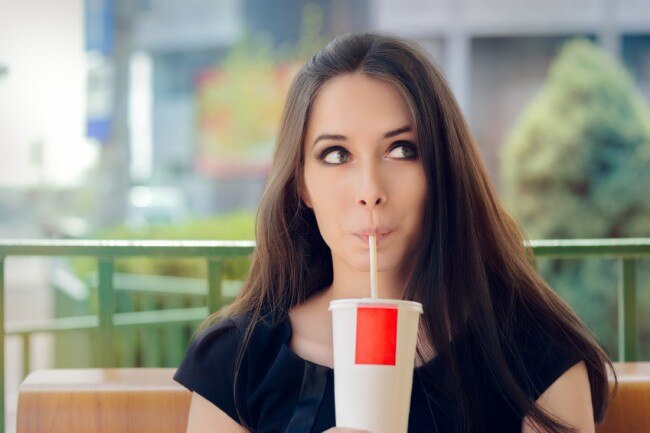For centuries, people from the United States to Uganda stayed hydrated and quenched their thirst with one of nature’s wonders: water. As the years have passed, our beverage options have flowed, with milk, beer, wine, coffee and tea among those following the water-only era.
Yet new, less healthy choices have in some cases crowded out those old standbys. These beverages-come-lately, according to Harvard University’s School of Public Health, “offer hydration but with a hefty dose of unnecessary calories that the body may have a hard time regulating.”

Here’s a rundown of six beverages that experts say are among the worst for your health.
- Sugary sodas
Not surprisingly, our no-no list begins with what’s now a staple of the American diet: sugary sodas.
“This one’s obvious because of the sheer volume of sugar and lack of beneficial proteins or fats. Empty calories at their worst!” nutritionist Aimee McNew says.
Fitness and nutrition coach Dan DeFigio, who runs BeatingSugarAddiction.com, points out that just one serving of a sugary soda can contain 50 grams of the sweet stuff.
Holistic health coach Tammie Eldridge ticks off a few other problems with sugary sodas:
- They’re 50,000 times more acidic than a neutral beverage would be. “It would require 30 glasses of clean water to balance out just one can of soda,” she says.
- Many sodas contain high-fructose corn syrup, which significantly raises insulin levels and has been linked to diabetes, obesity and metabolic syndrome, Eldridge says. Furthermore, she points out that most high-fructose corn syrup comes from genetically modified corn.
- Diet sodas
Tempted to get your soda fix with an artificially sweetened drink? If so, you might want to put down that can or cup.
Diet sodas normally contain artificial sweeteners like Splenda (sucralose) or Equal (aspartame). According to the Mayo Clinic, “there’s no sound scientific evidence” that any of the artificial sweeteners approved in the U.S. cause cancer or other serious health problems.
Still, critics remain skeptical, maintaining that artificial sweeteners are linked to migraines, seizures, autoimmune diseases and other health concerns. Nutrition coach Joanna Chodorowska stresses that artificial sweeteners are chemicals that impede the body’s ability to get rid of toxins.
- Fruit juices
You’d think that with the word fruit attached, juices automatically would be super-healthy. Not so, experts say.
“These are only slightly worse than commercial sodas sweetened with sugar. At least they contain higher levels of antioxidants,” research scientist and author Barry Sears says.
Most store-bought fruit juices are pasteurized, which strips out much of their nutritional value, Eldridge says. Unless juice is “raw” — meaning not pasteurized — “it is little more than flavored fructose,” she says. And as we know, fructose is a form of sugar.
“If you make it fresh at home, a glass of fruit juice now and again is OK, but drinking it every day will result in spikes in blood glucose, which causes increased insulin production, which then can cause weight gain,” Eldridge says.
- Juice drinks
Kids clamor for those cute little juice-drink boxes. Many moms think they’re a healthy substitute for regular juice. Those moms are wrong.
Juice drinks, whether they’re in a box or another container, must contain only 10 percent real fruit juice, according to DeFigio. To make up for the low percentage of actual fruit juice, manufacturers pack these drinks full of high-fructose corn syrup and other sweeteners, he says.
“Juice drinks are far worse than real fruit juice because they have all the calories and fructose, but none of the natural fruit juice’s nutrients,” DeFigio says.
- Fancy coffee drinks
While unadulterated black coffee typically is fine, its cappuccino, latte and mocha cousins are not. These drinks — the kind you’d gulp at the coffee shop — are loaded with sugar, caffeine and preservatives, McNew says.
“Since many of those beverages can top off at 1,000 calories or more, they can hardly be classified as part of a well-balanced diet,” she says.
- Sports drinks
Sports drinks have flooded the market, and they’ve touched off a flood of health concerns.
Leading brands of sports drinks typically contain as much as two-thirds the sugar of sodas, in addition to lots of sodium, Eldridge says. Other troubling ingredients you’ll probably find in sports drinks are high-fructose corn syrup, artificial flavoring and food coloring, she says.
“Sports drinks can provide a quick explosion of energy and quick crash as your pancreas and other glands do all they can to balance out the toxic stimulation to your blood sugar,” Eldridge says.
The good news is water can be transformed in a number of healthy ways so it’s more palatable, and, thereby, more likely for you to drink it. To substitute those sugary sports drinks, active individuals are better served mixing a non-GMO, plant-based electrolyte powder in their water bottles. For all-day, everyday hydration, however, fresh fruit is an easy and wholesome way to flavor plain H2O. Even easier: a drop or two of non-GMO, plant-based electrolyte powder.
